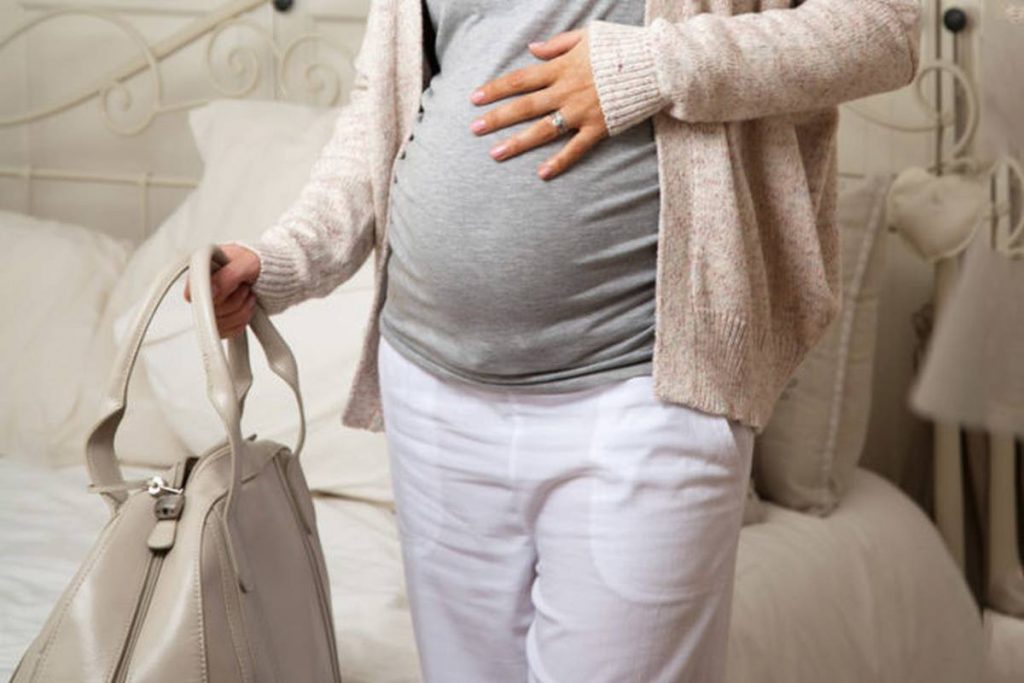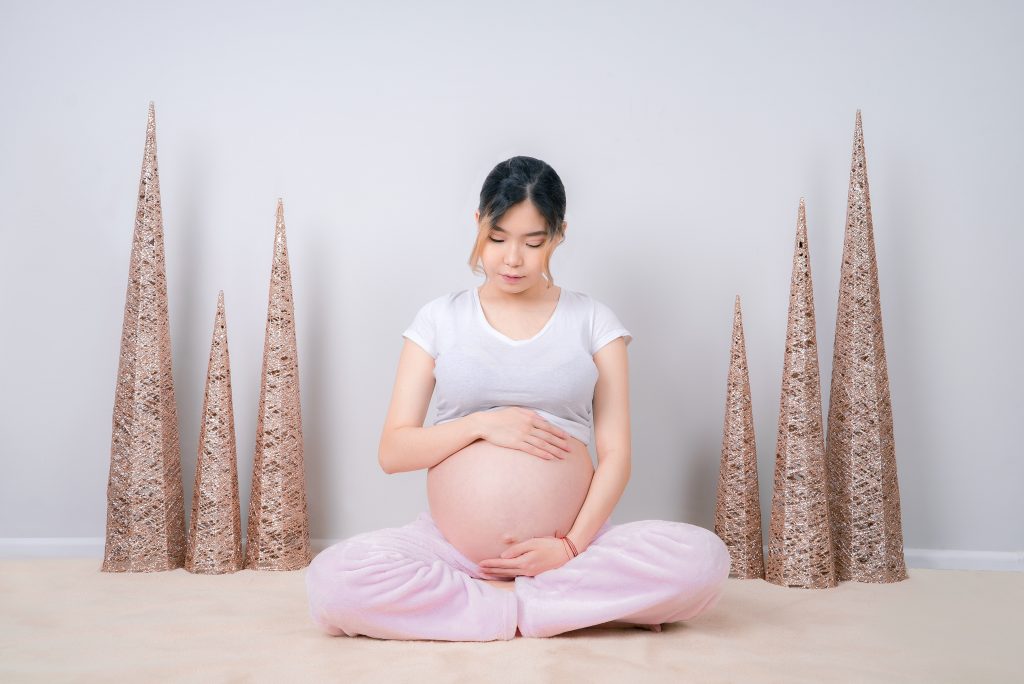Many people are continuously attempting to keep up with the latest beauty trends. "Pregnancy glow" is a common term used to describe a woman's appearance during her pregnancy. Do you know for sure if you're pregnant?
Several factors, including hormones and general satisfaction with one's physical self, have been linked to the so-called "pregnancy glow."
Increased blood flow carries oxygen and nutrients to the skin, contributing to its radiant appearance, according to some specialists.
The physical and emotional challenges of pregnancy are numerous and varied, and include symptoms like morning sickness, exhaustion, and swelling.
Many expectant mothers, however, eagerly anticipate one particular physical transformation: the pregnancy glow.
One of the effects of the hormonal shifts and surges that occur during pregnancy is a radiance to the skin known as the "pregnancy glow." So, count yourself lucky and bask in your pregnant glow while it lasts.
Why Do Women Look So Radiant While Pregnant?
It is unclear what causes the pregnant glow. There are, however, plausible, well-informed hypotheses linking it to a couple of pregnancy-related physiological changes.
Most of the observable alterations in skin tone and texture can be traced back to the aforementioned surge in hormone production. Your face will become oilier as a result of these hormones.
The improved circulation also plays a role. The body's blood-making capacity increases by around half during pregnancy.
It is hypothesised that due to this boost in circulation, your face would appear healthier and fuller.
In need of a lightweight baby crib? You need not look any further. Our extensive collection of lightweight cribs at My Baby Nursery has you covered.
What Are Some Tips for Keeping That Pregnancy Glow?
Pregnancy glow is normal and expected as mentioned above. The glow or radiance that radiates from most women's faces is highly valued. This physical shift is often cited as a positive aspect of pregnancy.
The problem is that this oil production boost might make your skin overly oily and perhaps lead to pregnant acne. You can wash your face with an oil-free cleanser to cut down on the sebum production, if this turns out to be the case.
We wish you the ability to flaunt your pregnancy glow and freedom from the pregnancy mask. A change in skin pigmentation is an unwelcome side effect of pregnancy-related physiology.
In this condition, known as the "mask of pregnancy," dark blotches or patches appear on the face and neck. They are often seen as less appealing than the pregnant glow, especially by many women.
The pregnancy mask normally falls off once the baby is born, which is wonderful news. It's unfortunate that the pregnant glow fades as well.
Whether you're expecting a child or not, maintaining regular, effective skincare routines is crucial.
In a Medical Context, What Exactly Is the Cause of the Pregnant Glow?
Lips, skin, hair, and nails can all undergo noticeable changes during pregnancy due to the mother's increased blood flow, estrogen, and progesterone, all of which have a profound effect on the body's physiology.

Increased Blood Flow Helps Out a Lot
When blood flows more freely to the skin, new cells are generated and the dead ones are removed, leaving behind skin that is visibly brighter, plumper, and more radiant.
The body's mucous membranes also enlarge, making them appear fuller and plumper. Thus, not only can the gums and eyes be affected, but the lips as well.
Some fortunate women may finally find some respite from the discomfort of chronic skin disorders.
Due to a mild inhibition of the immune system, some skin problems can improve during pregnancy.
The body doesn't want to reject whatever it is hosting because it is different and foreign. Improvements in the appearance of immune-mediated skin disorders including eczema and psoriasis may be seen as a result of this moderate inhibition of the immune system.
Hair That Is Thicker, Glossier, and More Lustrous
Hormones are responsible for both the pregnancy hair growth and the pregnancy hair loss.
Pregnancy hormones keep hair follicles in their active growth period, giving the hair an appearance of increased thickness and sheen.
As a result, there is a decrease in hair loss and an increase in hair growth, both of which contribute to the impression that the hair is in better condition.
Hair seems more hydrated and lustrous because progesterone boosts sebaceous secretions from the scalp.
Much like hair, nails may seem and feel much more energised and healthy as a result.
Here’s Some Bad News, by the Way...
If your normally wonderful hair, skin, and nails have taken a nosedive during pregnancy, this is good news!
It was inevitable.
Like Cinderella, whose "regular life" resumes after midnight strikes, life tends to return to normal after the birth of a child.
Pregnancy hormones and physiology produce these alterations, so once the baby is born, the body can begin reverting back to its pre-pregnancy state in as little as four to six weeks.
Some Other Pregnancy-Related Beauty Perks
Your Skin May Look Radiant and Much Healthier.
As cliche as it may sound, pregnant women do look healthier than they did before they became pregnant. The glow is the result of elevated levels of blood volume, oestrogen, and progesterone.
As a result of increased capillary density, the skin becomes 'rosy' and the features of the face become more pronounced.
Additionally, younger cells can emerge on the skin's surface while the drier, older cells can be shed.
When fat cells are eliminated, the skin becomes more radiant and silky smooth.
There’s a Chance That Your Lips Will Appear Fuller
In this condition, the body's mucous membranes swell and fill with extra blood and fluids, most noticeably in the face. Lips become more plump and redder in tone as a result of hormonal shifts, but that's not all the face that swells up: gums and eyes often take on a similarly bloated appearance, too.
Some Skin Issues May Get Better Over Time
It's unfortunate that hormone fluctuations during pregnancy (especially in the third trimester) might cause certain acne breakouts.
If you have psoriasis or eczema, though, you may find that your symptoms improve while you're carrying a child.
Because your body is now caring for a foreign thing (your kid) that it doesn't want to treat as a threat, it goes into a mild state of immunosuppression during pregnancy. Due to this, inflammatory skin disorders often go into remission or become less active during pregnancy.
Your Hair Could Get Thicker and More Glossy
The increased volume of your hair during pregnancy is likely due to the hormonal changes that occur at that time.
Your hair will appear fuller because pregnant hormones prolong the time your hair follicles spend in the anagen, or active, stage of the hair cycle.
Hormonal changes during pregnancy, especially an increase in progesterone, have been linked to an oilier than usual scalp. As a result, hair seems thicker and healthier all through pregnancy.
Since experiencing this stage is partly predetermined by one's genes, it may not happen to everyone. Moreover, it is important to note that this hair growth is not limited to the hair on your head, but can occur everywhere on your body.
Shop at My Baby Nursery for the most exquisite collection of baby cots and nursery equipment.
Nails Could Grow Longer and Stronger for You
It's natural for your hair to get thicker and stronger during pregnancy, and the same is true for your nails.
However, not all women experience this shift, even though it is thought to be caused by oestrogen. Strong nails can be grown with the help of prenatal vitamins and a healthy diet throughout pregnancy.
It’s Possible That Your Breasts Will Enlarge
It's true that pregnancy has several benefits, and larger breasts are one of them for some women. Increased levels of hormones involved in pregnancy cause this shift (HCG).
These hormones stimulate the breast tissue to begin the first steps of lactogenesis. The initiation of milk production from the breasts is known as lactogenesis. Any given woman might expect an average increase of two cup sizes.
Pregnant women often experience changes in their bodies, including larger breasts and darker, more prominent nipples.
Truth: These outward distinctions fade away when the kid is delivered.
This is because many of these advantages are caused by pregnancy hormones, which will gradually cease to be present when the pregnancy ends.
Whether you choose to breastfeed or use a breast pump, you will see a continued increase in breast size, but the majority of the hormonal changes will reverse themselves within the first four to six weeks after giving birth.
The normal pace of hair growth and the normal volume of your hair will be restored (which can cause much hair to shed).
Your plump lips and radiant skin will fade when your blood volume returns to normal, and you won't be sleeping much, either, so there goes whatever benefit you could have had from that. However, with your new baby on the way, you won't have time to stress over the alterations that come after childbirth.
When Exactly Do You Start to See Changes in Your Skin?
The answer is "maybe." Early in their pregnancies, many women notice a variety of skin abnormalities, such as discolorations, rashes, acne, redness, and other wonderful (not!) breakouts. For some, though, the skin doesn't show any signs of pregnancy until the second or third trimester.
However, you probably will have one of these at some point during your pregnancy because they are so common.
It's also possible that your skin will start to appear worse for wear as your pregnancy continues. Whether you're experiencing a flashback to your infantile days (with heat rash) or your adolescent years (with pimples and a greasy shine), rest assured that these skin symptoms will go away within a few weeks of giving birth. Wait patiently!
FAQS About Pregnancy Glow
Although there is no scientific evidence to back it up, most people start to develop a noticeable pregnancy glow when they enter their second trimester. If you're unfamiliar with the stages of pregnancy, the second trimester begins at week 13 (three months and one week) and goes through week 28 (seven months).
Skin and hair changes
Hormonal changes taking place in pregnancy will make your nipples and the area around them go darker. Your skin colour may also darken a little, either in patches or all over. Birthmarks, moles and freckles may also darken.
To maximize the effectiveness of BB Glow, it's recommended that you start with a series of 3-4 treatments, once every 2-4 weeks. After the initial series, the results of your BB Glow treatment can last up to 4 months or longer.
Some people also say that pregnancy glow can indicate whether you're having a boy or a girl. However, there's no scientific evidence that backs up these claims. Anecdotal evidence online reveals a combination of people who state correlations of pregnancy glow between both girls and boys.
Some pregnant women develop dark irregular patches on their face most commonly on the upper cheek, nose, lips, and forehead. This is called 'chloasma'. It is also sometimes known as 'melasma' or the 'mask of pregnancy'.
What Factors Lead To Pregnant Women’s Skin Changing?
You can blame your pregnancy hormones for the enlarged pores, the increased risk of heat rash, and the appearance of discolorations on your face, legs, palms, and soles.
The combination of stretched blood vessels and a weakened immune system (to protect the developing baby) might lead to skin irritation.
The following are some of the possible pregnancy-related skin changes:
- Acne breakout during pregnancy
- PUPPP (pruritic urticarial papules and plaques of pregnancy) is a particularly unpleasant form of skin eruption caused mostly by hormones and manifesting as skin-colored to pink or dark lumps.
- Pregnancy is also a frequent time for women to develop skin tags, which are benign, elevated growths on the skin that often appear under the arms.
- Dry skin
- Red palms (called palmar erythema)
- Spider veins
- Oily skin
Why Your Skin Glows While You're Pregnant

Have You Been Glowing Lately?
Some pregnant women report receiving the praise, "you're glowing." During pregnancy, many women notice a change in their facial features.
This is a common occurrence during pregnancy and can have a number of causes. The term "pregnancy glow" may sound fanciful, yet there are credible scientific reasons for the phenomenon. Let's get to the bottom of the pregnant glow mystery and find out if there's more to it than meets the eye.
Why Does It Occur?
Pregnancy glow is said to be the result of happiness, according to centuries-old folklore. Some people think it could be due to the baby's sex.
There are many potential medical explanations for the glow, despite the fact that you may be feeling cheerful and excited during pregnancy.
Changes in hormone levels and blood flow are the most likely causes, while other aspects of your life may also be contributing to your radiant appearance.
Changes in Hormone Levels
A pregnant flush is a telltale sign since it occurs when your body's hormone levels are rising over normal. Hormones fall within this category and some examples are estrogen, progesterone, and human chorionic gonadotropin.
Improved Circulation
More blood is produced by the body during pregnancy. The reason for this is because as your baby grows, more blood must be sent to your uterus and other organs to accommodate the new life inside of you. This is because the increased blood volume causes the blood vessels to expand, giving you that red flush.
Excess Sebum Production
Hormonal changes cause an increase in oil production by the sebaceous glands in some women. Additionally, elevated blood volume may stimulate greater oil secretion. If your skin naturally tends towards oiliness or a combination of dry and oily patches, you may be more susceptible.
Acne is one of the possible negative consequences. Oily skin causes pimples, but it can also give off a luminous appearance.
Skin Stretching
Pregnancy skin can glow due to a combination of factors, including increased blood flow, hormone changes, and the natural stretching of the skin.
Experiencing Heat Rash
During pregnancy, it's common to experience a rise in body temperature. This is due to the fact that, in addition to hormonal changes, the extra weight you're carrying might cause your core temperature to rise. As a result, you may have heat rashes or hot flushes, both of which can leave your skin looking radiant.
Worsening Of Preexisting Skin Conditions
There are a number of skin disorders that can worsen during pregnancy, so it's important to keep an eye on how you feel. Eczema, rosacea, and psoriasis are all examples of such diseases. In addition, increased blood flow and hormones may cause the affected skin to redden even more, making it more apparent. This is sometimes misunderstood as the "pregnancy glow."
When Will It Begin, and How Long Will It Last?
Pregnancy glow can occur at any point throughout a woman's pregnancy. This radiance, though, may be more common during the third trimester, when your body is going through the most dramatic changes.
The prenatal glow, and whatever caused it, quickly fades after giving birth. But rest assured, this won't affect your skin forever.
Does Everyone Experience This?
Even while all pregnant women endure hormonal changes, not all of them will feel or look radiant during their pregnancy. Not doing so is not always indicative of any problems. Instead, this may suggest that your skin has a unique reaction to your internal health.
Possible Skin Reactions You Might Experience
As was said before, pregnant acne happens because your oil glands are producing more sebum than usual. It might cause shine and even breakouts if used too often.
You should keep up your twice-daily facial cleansing routine, although you may find that oilier skin care products work better for you during your pregnancy. Consult your doctor about which products are safe to use while expecting.
One other pregnancy-related skin problem that might be mild or severe depends on the individual woman.
Hyperpigmentation, often known as brown spots, occurs when the skin produces too much melanin and becomes discoloured. Sun exposure, however, can make these spots worse and can even cause them to disappear after pregnancy, when hormone levels have returned to normal. To avoid this, it is recommended to use sunscreen daily.
What Does a Positive Pregnancy Glow Tell You About Your Baby's Gender?
While you wait to find out the gender of your baby, you may find it entertaining to make educated guesses. You may have heard, for instance, that your "style of carrying" your unborn child, as well as your cravings and aversions to certain foods, can disclose whether you're expecting a boy or a girl.
Pregnancy glow, it is said, might reveal whether you're carrying a boy or a girl. While these assertions may be appealing, they are not supported by any scientific data.
Online anecdotal evidence shows that both females and boys report experiencing pregnancy glow.
By the 16-week milestone, an ultrasound can usually reveal the gender of a baby. There is probably no correlation between your pregnancy glow and your current stage of pregnancy.
Conclusion
"Pregnancy glow" is a common term used to describe a woman's appearance during her pregnancy. Several factors, including hormones and satisfaction with one's physical self, have been linked to the 'glow'. Your face will become oilier as a result of these hormones and improved circulation also plays a role. Lips, skin, hair, and nails can all undergo noticeable changes during pregnancy. Increased blood flow, estrogen, and progesterone have a profound effect on the body's physiology.
Maintaining regular, effective skincare routines is crucial to maintaining a natural pregnancy glow. Pregnant women's face and hair may appear more flushed, fuller and more plump as a result of hormonal shifts. Inflammatory skin disorders may go into remission or become less active during pregnancy. Increased volume of your hair is likely due to hormonal changes that occur at that time. Pregnant women often experience changes in their bodies, including larger breasts and darker, more prominent nipples.
The majority of the hormonal changes will reverse themselves within the first four to six weeks after giving birth. Your plump lips and radiant skin will fade when your blood volume returns to normal. The term "pregnancy glow" may sound fanciful, yet there are credible scientific reasons for the phenomenon. The combination of stretched blood vessels and a weakened immune system might lead to skin irritation. Pregnancy is also a frequent time for women to develop skin tags, which are benign, elevated growths on the skin that often appear under the arms.
Pregnancy skin can glow due to increased blood flow, hormone changes, and the natural stretching of the skin. This radiance may be more common during the third trimester, when your body is going through the most dramatic changes. The prenatal glow, and whatever caused it, quickly fades after giving birth. There is probably no correlation between your pregnancy glow and your current stage of pregnancy. Pregnancy glow, it is said, might reveal whether you're carrying a boy or a girl. While you wait to find out the gender of your baby, you may find it entertaining to make educated guesses.
Content Summary
- Pregnancy glow" is a common term used to describe a woman's appearance during her pregnancy.
- Several factors, including hormones and general satisfaction with one's physical self, have been linked to the so-called "pregnancy glow."
- One of the effects of the hormonal shifts and surges that occur during pregnancy is a radiance to the skin known as the "pregnancy glow."
- So, count yourself lucky and bask in your pregnant glow while it lasts.
- It is unclear what causes the pregnant glow.
- This physical shift is often cited as a positive aspect of pregnancy.
- The problem is that this oil production boost might make your skin overly oily and perhaps lead to pregnant acne.
- You can wash your face with an oil-free cleanser to cut down on the sebum production, if this turns out to be the case.
- They are often seen as less appealing than the pregnant glow, especially by many women.
- It's unfortunate that the pregnant glow fades as well.
- Whether you're expecting a child or not, maintaining regular, effective skincare routines is crucial.
- Lips, skin, hair, and nails can all undergo noticeable changes during pregnancy due to the mother's increased blood flow, estrogen, and progesterone, all of which have a profound effect on the body's physiology.
- Due to a mild inhibition of the immune system, some skin problems can improve during pregnancy.
- Hormones are responsible for both the pregnancy hair growth and the pregnancy hair loss.
- As a result of increased capillary density, the skin becomes 'rosy' and the features of the face become more pronounced.
- When fat cells are eliminated, the skin becomes more radiant and silky smooth.
- It's unfortunate that hormone fluctuations during pregnancy (especially in the third trimester) might cause certain acne breakouts.
- If you have psoriasis or eczema, though, you may find that your symptoms improve while you're carrying a child.
- Due to this, inflammatory skin disorders often go into remission or become less active during pregnancy.
- The increased volume of your hair during pregnancy is likely due to the hormonal changes that occur at that time.
- As a result, hair seems thicker and healthier all through pregnancy.
- Moreover, it is important to note that this hair growth is not limited to the hair on your head, but can occur everywhere on your body.
- Strong nails can be grown with the help of prenatal vitamins and a healthy diet throughout pregnancy.
- It's true that pregnancy has several benefits, and larger breasts are one of them for some women.
- Increased levels of hormones involved in pregnancy cause this shift (HCG).
- Pregnant women often experience changes in their bodies, including larger breasts and darker, more prominent nipples.
- This is because many of these advantages are caused by pregnancy hormones, which will gradually cease to be present when the pregnancy ends.
- Whether you choose to breastfeed or use a breast pump, you will see a continued increase in breast size, but the majority of the hormonal changes will reverse themselves within the first four to six weeks after giving birth.
- However, with your new baby on the way, you won't have time to stress over the alterations that come after childbirth.
- For some, though, the skin doesn't show any signs of pregnancy until the second or third trimester.
- However, you probably will have one of these at some point during your pregnancy because they are so common.
- It's also possible that your skin will start to appear worse for wear as your pregnancy continues.
- You can blame your pregnancy hormones for the enlarged pores, the increased risk of heat rash, and the appearance of discolorations on your face, legs, palms, and soles.
- During pregnancy, many women notice a change in their facial features.
- This is a common occurrence during pregnancy and can have a number of causes.
- The term "pregnancy glow" may sound fanciful, yet there are credible scientific reasons for the phenomenon.
- Let's get to the bottom of the pregnant glow mystery and find out if there's more to it than meets the eye.
- Pregnancy glow is said to be the result of happiness, according to centuries-old folklore.
- Some people think it could be due to the baby's sex.
- There are many potential medical explanations for the glow, despite the fact that you may be feeling cheerful and excited during pregnancy.
- Changes in hormone levels and blood flow are the most likely causes, while other aspects of your life may also be contributing to your radiant appearance.
- If your skin naturally tends towards oiliness or a combination of dry and oily patches, you may be more susceptible.
- Pregnancy skin can glow due to a combination of factors, including increased blood flow, hormone changes, and the natural stretching of the skin.
- During pregnancy, it's common to experience a rise in body temperature.
- As a result, you may have heat rashes or hot flushes, both of which can leave your skin looking radiant.
- There are a number of skin disorders that can worsen during pregnancy, so it's important to keep an eye on how you feel.
- This is sometimes misunderstood as the "pregnancy glow."
- Pregnancy glow can occur at any point throughout a woman's pregnancy.
- This radiance, though, may be more common during the third trimester, when your body is going through the most dramatic changes.
- The prenatal glow, and whatever caused it, quickly fades after giving birth.
- But rest assured, this won't affect your skin forever.
- Even while all pregnant women endure hormonal changes, not all of them will feel or look radiant during their pregnancy.
- Not doing so is not always indicative of any problems.
- Instead, this may suggest that your skin has a unique reaction to your internal health.
- As was said before, pregnant acne happens because your oil glands are producing more sebum than usual.
- You should keep up your twice-daily facial cleansing routine, although you may find that oilier skin care products work better for you during your pregnancy.
- One other pregnancy-related skin problem that might be mild or severe depends on the individual woman.
- While you wait to find out the gender of your baby, you may find it entertaining to make educated guesses.
- You may have heard, for instance, that your "style of carrying" your unborn child, as well as your cravings and aversions to certain foods, can disclose whether you're expecting a boy or a girl.
- Pregnancy glow, it is said, might reveal whether you're carrying a boy or a girl.
- By the 16-week milestone, an ultrasound can usually reveal the gender of a baby.
- There is probably no correlation between your pregnancy glow and your current stage of pregnancy.






